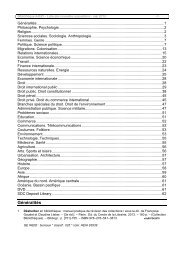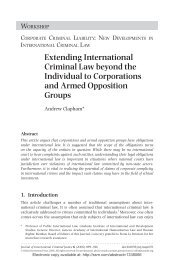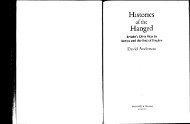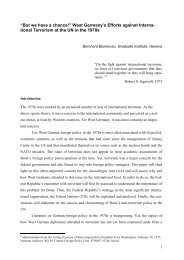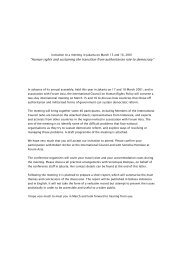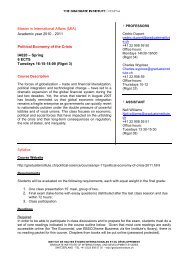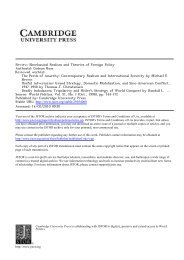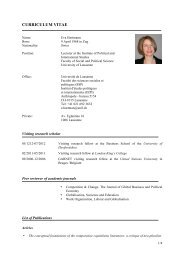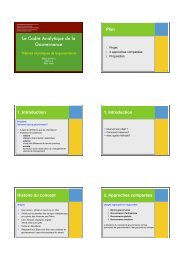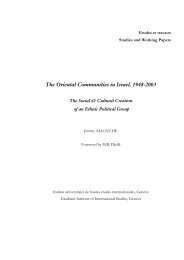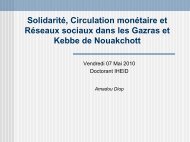Download [pdf] - The Graduate Institute, Geneva
Download [pdf] - The Graduate Institute, Geneva
Download [pdf] - The Graduate Institute, Geneva
You also want an ePaper? Increase the reach of your titles
YUMPU automatically turns print PDFs into web optimized ePapers that Google loves.
MACHA LEVINSON<br />
PhD 1974<br />
Entering the <strong>Graduate</strong> <strong>Institute</strong>, then still the HEI, in 1968<br />
was as daunting as it is today. <strong>The</strong> standards were high.<br />
American academic achievement did not impress <strong>Geneva</strong>’s<br />
professors and it was only because I already had a Master’s<br />
degree from New York’s Columbia University and its Russian<br />
(later Harriman) <strong>Institute</strong> and had served as a US Foreign<br />
Service Officer on the disarmament delegation in <strong>Geneva</strong>,<br />
that I was admitted to the doctoral programme. Still, two<br />
years of courses were required before I was allowed to<br />
write a thesis and get my degree.<br />
It was a stimulating and challenging period. <strong>The</strong> <strong>Institute</strong><br />
was buzzing with intellectual discourse. Although, with<br />
three little children at home, I had to forego most extracurricular<br />
activities, it was easy to run down the avenue de la<br />
Paix to hear the outstanding guest lecturers that the <strong>Institute</strong><br />
attracted.<br />
Armed with a new doctorate, I became a consultant to<br />
Iran’s disarmament delegation and to the Stockholm<br />
International Peace Research <strong>Institute</strong>. <strong>The</strong>n I jumped over<br />
the wall and became strategic affairs editor for the <strong>Geneva</strong><br />
based International Defense Review, writing on armaments<br />
and military strategy. My big break came when I joined the<br />
World Economic Forum in 1987. <strong>The</strong> Berlin wall came down<br />
two years later, splintering the communist camp and opening<br />
up Eastern Europe. <strong>The</strong> secret world we, students of<br />
the Soviet Union, had tried to study and penetrate suddenly<br />
became accessible. We invited the new leaders of Russia<br />
and Eastern Europe to Davos and heard of the historic<br />
events they had witnessed. We were all caught up in the<br />
fervor and excitement of the moment.<br />
Macha Levinson.<br />
political and new business leaders of the region. We held<br />
meetings in Moscow (almost annually), St Petersburg, the<br />
Baltics, Kazakhstan, Warsaw, Budapest, Prague and for<br />
seven years we held an annual Central and Eastern European<br />
Economic Summit which brought up to 800 politicians and<br />
executives from all these countries together in Salzburg,<br />
Austria. Over the 20 years spent at the Forum, I also headed<br />
the Energy sector and coordinated the Global Competitiveness<br />
Report.<br />
<strong>The</strong> years at the <strong>Institute</strong> had given me the international<br />
orientation which made all this possible and there can be<br />
no better preparation for a career in a global world than<br />
that offered by the <strong>Graduate</strong> <strong>Institute</strong>.<br />
As director for Eastern and Central Europe, I organised<br />
innumerable conferences and round tables bringing heads<br />
of Western business and government together with the<br />
LA REVUE DE L’INSTITUT I THE GRADUATE INSTITUTE REVIEW I GLOBE I N11 Printemps I Spring 2013<br />
29


![Download [pdf] - The Graduate Institute, Geneva](https://img.yumpu.com/23370020/30/500x640/download-pdf-the-graduate-institute-geneva.jpg)
